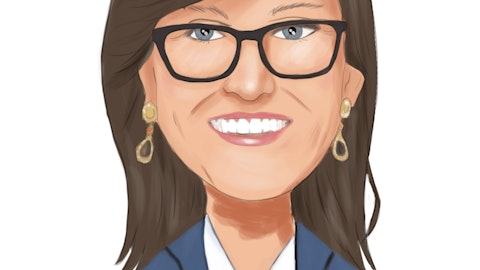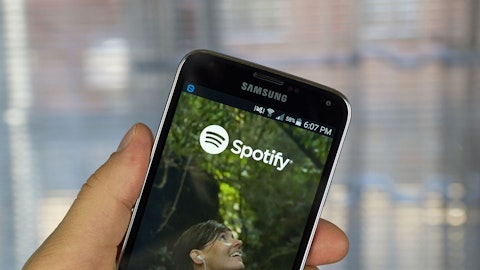Bryan Goldberg: Okay. Benjamin Black on audiobooks. Audiobooks monetization is via overage charges. But how do you think about medium-term monetization of this offering? Will there be additional tiers with discrete payments for access? And at your Investor Day, you highlighted 40% plus gross margins for audiobooks. What’s the bridge from this offering to hitting those targets?
Daniel Ek: Yes, I’ll start, and maybe Paul can chime in. So I think, first and foremost, it’s very early days on the audiobook side, but we’re encouraged with what we’re seeing. So you’re right in that this is included in the premium offering. It is one of the benefits, obviously, that our members are getting and that, in turn, gives us more flexibility as a business that we talked about. Just as a reminder, however, the offering available for consumers is 15 hours a month. For consumers that hit that base or subscribers that hit that base of 15 hours a month, there is the ability to top up. So there’s already today the ability for discrete payments where consumers can upgrade and we’re already seeing consumers doing that in ways we probably wouldn’t have imagined where some consumers are heavily upgrading and being really heavy audiobooks listeners already day one.
But obviously, the base is very small. So it’s impossible for us to say where that leads us long-term. But the ability exists, and I think it will be a part of our business, but we also, of course, think that being part of the subscription is what the real value is because it will expand the market of audiobooks. And we think consumers — it’s a format that consumer loves and that creates more value, which, of course, gives us more flexibility for our business. You want to talk as well about the bridge between audiobooks and the 40% we talked about?
Paul Vogel: Yes. So yes, we’re not getting specifics of kind of how the monetization is going to work right now. But I think what I would go back to saying, which I think I’ve said a couple of times now, is there’s obviously always an investment when you launch a new product. We don’t think it’s anything that’s going to be a material impact our 2024 gross margin trajectory. And we think that there’s — it’s not a long window until we see audiobooks really being additive to Spotify from a bottom line perspective. And we’ll have more to talk about it moving forward.
Bryan Goldberg: All right. Next question from Doug Anmuth on podcasting. How should we think about the timing for achieving podcast gross margin profitability? And what are the biggest opportunities to improve podcast cost structure going forward?
Paul Vogel: Yes. So let me take the second part first. So I think as Daniel has talked about, for us, it’s really a number of things. One is we’re just continuing to look to try and be the most efficient we possibly can as a business. And so that’s going to mean investing where we think it makes sense to invest and it’s going to mean thinking about how we can be strategic in areas we can be more strategic. And so on the podcasting side, you’ve already seen us this year sort of right-sized parts of the business where we thought it made sense. But moving forward, we’ll continue to invest, but we also think we’re going to continue to get lots of efficiencies and that’s through being smarter about where we spend that podcasting budget and also continue to grow the advertising on top of it.
So we feel like we’re on track. I think we gave at the Investor Day sort of a one to two-year time line to breakeven on podcasting. We’re right in line with that time line. We should actually get to breakeven and podcasting pretty soon and we feel really good about the trajectory of the podcasting trends having gone from a pretty big drag a year ago to something that’s a pretty minimal drag to something that should be positive to gross profit in the pretty short-term.
Daniel Ek: Yes. And maybe just, Doug, as an added reminder, unlike, say, the music business, which has more of a variable cost structure, podcasting has more of a fixed cost basis and a variable too. But the biggest proponent so far has been the fixed cost base structure. So what helps there is obviously, if you take down the fixed cost base structure, but the other thing that helps us more scale. So if you bring in more advertising dollars across that, you’ll start seeing gross margins improving. So both of those things have been true. We’ve been raining back on some of the spending, but we have also increased the revenues on podcasting, too.
Bryan Goldberg: Okay. Next question from Benjamin Black on operating expenses. You obviously made some hard decisions on headcount reductions this year. When looking forward to fourth quarter and 2024, how should we be thinking about the pace of operating expense and headcount growth. And also, is there more room to tighten up expenses?
Paul Vogel: Yes. So I’m not going to give any 2024 guidance yet. We’ll do that on the next quarter. So really, what I’ll do is kind of reiterate what we said already, which is as a company and as a business, we want to be as efficient as we possibly can. And so that’s something that is not a onetime thing, some of the changes we made in 2023, we’re not sort of one-time in nature. This is the way we’re running the business. We’ve talked about, we believe we have a best-in-class product, and we want to become a best-in-class business as well. And so we’ll continue to look whether it’s 2024 or ’25 or ’26, about how we can run the business as efficiently and effectively as we possibly can. And so that’s just how we think about it moving forward. And hopefully, our expectation is that will translate into kind of hitting all the margin targets we laid out at the Investor Day.
Bryan Goldberg: Okay. It looks like Ben’s got another one here on music economics. Without getting into the details from your price negotiations with the labels, I’m curious to hear how the win-win played out? Is it related to better economics on the ad-supported side, marketplace commitments, more flexibility to introduce new tier options by bundling services like audiobooks or anything else?
Daniel Ek: Yes. Well, as you know, Ben, we don’t comment on the specifics around our negotiations with any rights holders. But what I can say in general terms is, and I’ve used this analogy before, when we renegotiate with our partners, this is something that’s constantly ongoing pretty much every year. It is kind of trade — it’s like a trade agreement being renegotiated. There are lots of things in the agreement, lots of things that the labels want from Spotify, lots of things that Spotify wants from labels, including clearing up things like small things like lyrics, how it works, what the payment terms are, et cetera, new market entries, just a whole host of things. So it’s not one thing. It is a lot of different things, including some of the things that you’re talking about.




